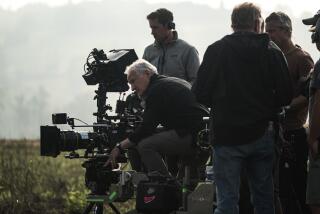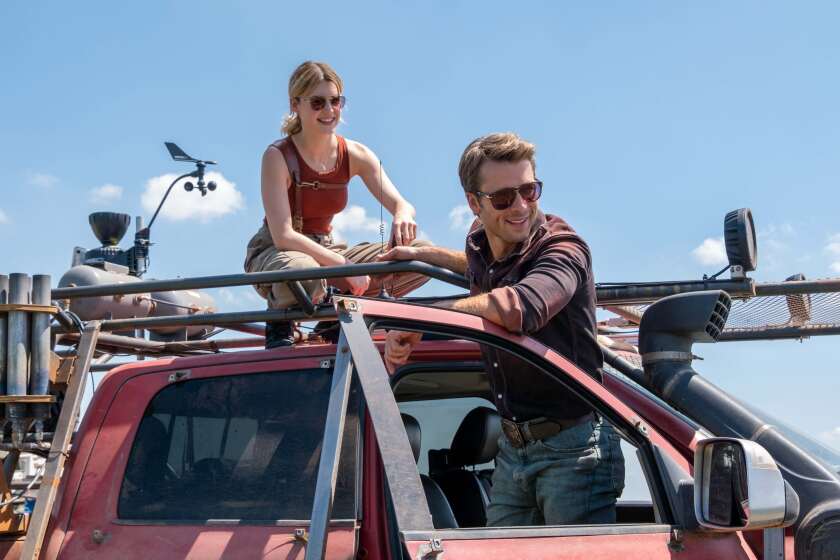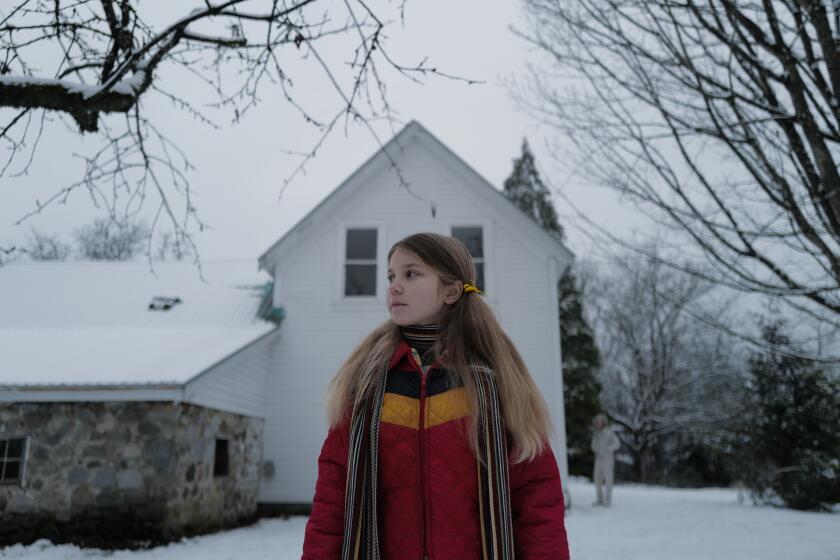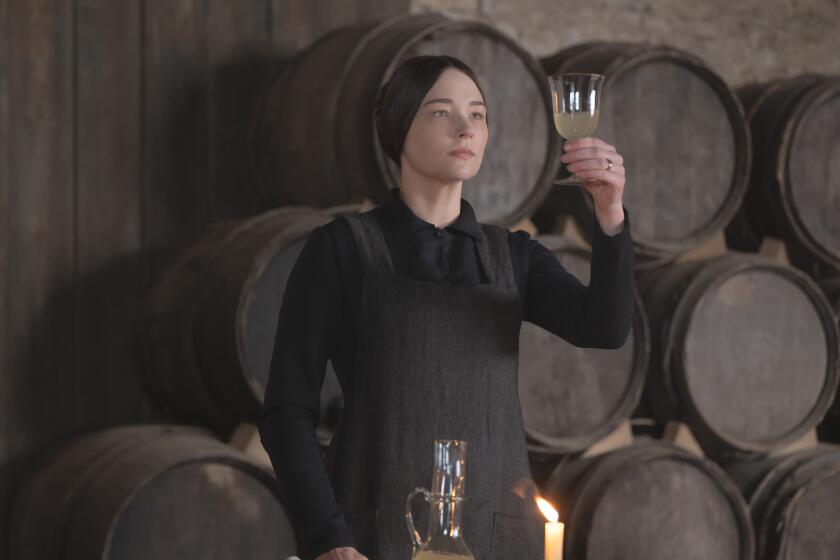Into a different sort of no man’s land
Bosnian writer and director Danis Tanovic is sprawled on a chocolate brown velvet sofa in a posh Parisian apartment, gazing intently at the film monitor in front of him. No need for the standard canvas chair when he can direct his cast from the comfort of the sofa, which is part of the decor of a set at Arpajon Studios near Paris. “Might as well take advantage of it,” he shrugs, flashing a boyish smile. With his tousled dark curly hair, stubble beard, worn jeans and hooded Gap sweatshirt, Tanovic, 35, looks more like a student than an Academy Award-winning filmmaker.
It’s been four years since he made his name with his first feature film, “No Man’s Land.” Shot with a $1-million budget, the tragicomic drama about the horrors of the Bosnia-Herzegovina war won the 2001 Oscar for best foreign language film as well as nearly 60 other international prizes.
Now, Tanovic is deep into “Hell.” It is Day 36 of the shoot for his second feature-length movie, adapted from a screenplay in a trilogy by the late Polish director Krzysztof Kieslowski and co-writer Krzysztof Piesiewicz. Set in Paris in the 1980s, “Hell” recounts the parallel lives of three sisters who endure the shame of a terrible family secret about their father’s past. As children, they witnessed his suicide on the day he returned home from prison but learn the truth about his crime only after many years of useless suffering.
You wouldn’t know it from Tanovic’s joking banter with the cameramen between takes, but he’s all wound up. It’s a steamy, emotional climax in which Sophie, the eldest sister, portrayed by French actress Emmanuelle Beart, confronts her unfaithful husband, played by Jacques Gamblin.
While preparing for the 12th take, Tanovic begins to whistle the theme from “Mission: Impossible” as he waits for his star, Beart. Sure, it might seem like a flip reference to the actress’ 1996 Hollywood debut in the thriller as Tom Cruise’s costar, but Tanovic is by no means mocking her. It’s just a sign of the director’s quirky, dark sense of humor, which seems to give him a deep connection with his actors.
In the tiny reconstructed kitchen behind the living room wall, Beart sits at the breakfast table, dressed in black silk skirt and a loose gray sweater that keeps slipping off her shoulder. In the scene, her character is taunting her husband about his mistress. “When was the last time you touched me?” she hisses and suddenly throws herself on Gamblin’s knees. Covering him with desperate kisses, she places his hand on her bared breast and starts hiking up her skirt. Gently, he pushes her away.
Beart’s face is tear-stained, her smoldering blue eyes framed by strands of honey-blond hair that have come undone from her coiled chignon. “Why didn’t you tell me that you don’t love me anymore?! Liar!” she screams and overturns the table.
Gamblin’s character, Pierre, finally reacts and shoves Beart so hard that she goes flying across the room, knocking her head against the window. This is not in the script.
Tanovic and his crew exchange alarmed glances as they hear glass shatter in the next room, but the cameras continue to roll. “Cut!” Tanovic yells as the scene comes to an end. He bounds into the kitchen to make sure no one has been hurt, but Beart is fine, even if she’s a little black and blue and scratched. She wouldn’t have it any other way.
“While we were shooting, Danis made me understand to what extent you have to develop your imagination as an actress -- the freedom to throw yourself into the scene, at the risk of going too far and feeling really awful,” Beart later confides. “Your body has to be taut like a bow, and your mind constantly alert.
“I’ve worked with some great directors in the past 18 years, but what you get from Tanovic is unique, instinctive. He’s not talkative, but when he puts his hand on your shoulder, you know just what he means. His joie de vivre is contagious and you can’t help wanting to risk your neck for him. Everything felt like the first time -- he was always surprising me.”
But then, Tanovic is the first to admit that he often surprises himself. He hadn’t expected to work on “Hell,” one of the scripts in Kieslowski’s trilogy (“Hell,” “Purgatory,” “Heaven”), left behind at the director’s death in 1996. “When I first read ‘Hell’ five years ago, it didn’t do anything to me.” At the time, he was filming “No Man’s Land” and deeply involved in the Bosnian war atmosphere.
Tanovic, who had studied with Kieslowski in film school, was more intrigued by “Purgatory” but put the project aside and ended up making a short film for the 11-director collaboration “September 11.”
Then Miramax bought the trilogy rights but decided to drop them last year, given the commercial failure of the first story, “Heaven” (2002), by German director Tom Tykwer. Soon afterward, Tanovic’s agent, Nicole Cann, and his longtime friend and producer, Cedomir Kolar, urged him to have another look at Kieslowski’s two remaining scripts.
“After seven pages of ‘Purgatory’ I said to myself, ‘Oh, no, not war again! I’m too tired!’ So I picked up ‘Hell’ instead and couldn’t put it down. Why hadn’t I seen how good it was before? But that was before I got married and became a father. Your point of view definitely changes. I used to ride my motorcycle like a madman -- now I won’t even get on it if it’s drizzling!” Tanovic and his Belgian wife have two young daughters and are expecting their third child.
The concept of hell, as Tanovic sees it, has nothing to do with war, at least overtly. “Hell,” he says, “is the society we’ve created, full of lonely people and unhappiness.”
A fan of the French system
Why did Tanovic choose to set the story in Paris, where he now resides, and use an all-French cast?
“The beauty of making a film in France,” he explains, “is that when you think of an actor, you just give them a call, send the screenplay, and two days later you have an answer. I’m really bothered by the agent system in the U.S. and England, where you have to go through at least three people to make contact with an actor.”
Despite “Hell’s” modest budget (6 million euros -- almost $8 million -- in a multinational French, Belgian, Italian and Japanese co-production), Tanovic was able to attract an impressive cast of stars such as Carole Bouquet, Karine Viard, Marie Gillain, Jacques Perrin and Guillaume Canet.
Not surprisingly, Tanovic also is a fan of France’s law that grants a director the right to determine the final cut (“What’s the use of making a $50-million movie if it’s not your film?”). Nevertheless, he plans to shoot his next two films in English.
The first will be “Triage,” based on an American novel by Scott Anderson. “It’s about a war photographer, a subject that really interests me,” he says. Tanovic, who was attending the Sarajevo Film Academy in 1992 when the war broke out, spent the next two years shooting hundreds of hours of documentary footage.
The story of “Triage” involves a young man sent to photograph the battles between Kurdish separatists and Iraqi troops. Once he returns home to his loved ones, he remains haunted by the traumatic events he has witnessed.
The second film project is based on Tanovic’s original script titled “Ship High in Transit.”
Given the overwhelming critical praise for his first movie, does Tanovic feel pressured to match that success?
“I left pressure behind in 1994 in Sarajevo. Since then, it’s an easy life,” he says with a sigh. “One of my film professors once told me that the most important voyage you’ll ever make is from zero to one. After that, it’s all repetition.”
More to Read
Only good movies
Get the Indie Focus newsletter, Mark Olsen's weekly guide to the world of cinema.
You may occasionally receive promotional content from the Los Angeles Times.






